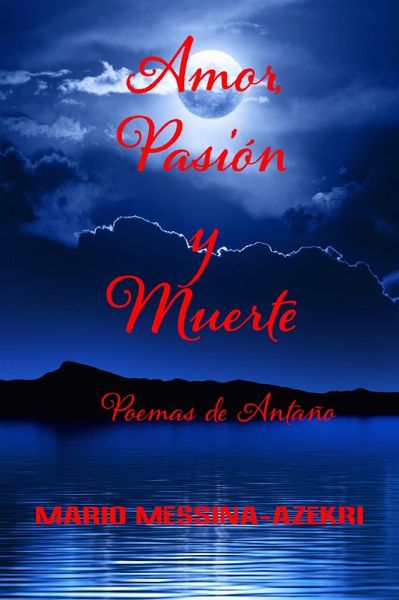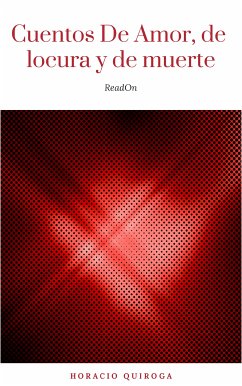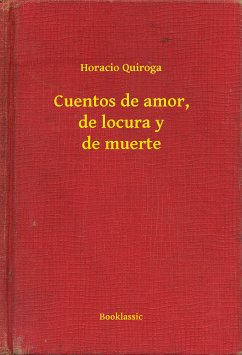
Amor, Pasión Y Muerte (eBook, ePUB)

PAYBACK Punkte
0 °P sammeln!
Entre 1975 y 1985, Mario escribió una antología de poemas que ahondaban en el ámbito de las emociones asociadas a las relaciones románticas, las pérdidas y la ansiedad. Estas obras poéticas encapsulan un espectro de sentimientos que recuerdan a la poesía clásica española, tocando temas como el rechazo, el abandono, la muerte y la ira. Las composiciones de Mario resuenan con la esencia de las antiguas tradiciones poéticas españolas, marcadas por la rima y la métrica de sílabas, evidentes en sus nueve sonetos. A pesar de enfrentar críticas por adherirse a este estilo de escritura t...
Entre 1975 y 1985, Mario escribió una antología de poemas que ahondaban en el ámbito de las emociones asociadas a las relaciones románticas, las pérdidas y la ansiedad. Estas obras poéticas encapsulan un espectro de sentimientos que recuerdan a la poesía clásica española, tocando temas como el rechazo, el abandono, la muerte y la ira. Las composiciones de Mario resuenan con la esencia de las antiguas tradiciones poéticas españolas, marcadas por la rima y la métrica de sílabas, evidentes en sus nueve sonetos. A pesar de enfrentar críticas por adherirse a este estilo de escritura tradicional, teje hábilmente versos que exploran las complejidades de las emociones humanas. Sus poemas no solo reflejan sentimientos personales, sino que también profundizan en reflexiones más amplias sobre el mundo y la humanidad. Dentro de los versos de Mario, la muerte asume varios roles, alternativamente retratada como libertadora o como adversaria. Es importante señalar que su uso de formas y temas clásicos no aboga por una perspectiva mórbida ni fomenta los pensamientos suicidas. En cambio, Mario invita a los lectores a comprender el profundo dolor experimentado por los personajes de sus poemas y a considerar la existencia de un reino etéreo más allá de los confines del mundo físico.
Mario Messina-Azekri, a native of Argentina, relocated to the United States at the age of 16 following the demise of his parents in Mexico, where he had resided for four years. Between 1975 and 1985, Mario penned an anthology of poems delving into the realm of emotions associated with romantic relationships losses and anxiety. These poetic works encapsulate a spectrum of sentiments reminiscent of classical Spanish poetry, touching upon themes such as rejection, abandonment, death, and anger.
Mario's compositions resonate with the essence of old Spanish poetic traditions, marked by rhyme and meter of syllables, evident in his nine sonnets. Despite facing criticism for adhering to this traditional writing style, he skillfully weaves together verses that explore the intricacies of human emotions. His poems not only reflect personal sentiments but also delve into broader reflections on the world and humanity.
Within Mario's verses, death assumes various roles, alternately portrayed as a liberator or an adversary. It is important to note that his use of classical forms and themes does not advocate for a morbid perspective or encourage thoughts of suicide. Instead, Mario invites readers to comprehend the profound pain experienced by the characters in his poems and to consider the existence of an ethereal realm beyond the confines of the physical world.
Mario Messina-Azekri, a native of Argentina, relocated to the United States at the age of 16 following the demise of his parents in Mexico, where he had resided for four years. Between 1975 and 1985, Mario penned an anthology of poems delving into the realm of emotions associated with romantic relationships losses and anxiety. These poetic works encapsulate a spectrum of sentiments reminiscent of classical Spanish poetry, touching upon themes such as rejection, abandonment, death, and anger.
Mario's compositions resonate with the essence of old Spanish poetic traditions, marked by rhyme and meter of syllables, evident in his nine sonnets. Despite facing criticism for adhering to this traditional writing style, he skillfully weaves together verses that explore the intricacies of human emotions. His poems not only reflect personal sentiments but also delve into broader reflections on the world and humanity.
Within Mario's verses, death assumes various roles, alternately portrayed as a liberator or an adversary. It is important to note that his use of classical forms and themes does not advocate for a morbid perspective or encourage thoughts of suicide. Instead, Mario invites readers to comprehend the profound pain experienced by the characters in his poems and to consider the existence of an ethereal realm beyond the confines of the physical world.
Dieser Download kann aus rechtlichen Gründen nur mit Rechnungsadresse in A, B, CY, CZ, D, DK, EW, E, FIN, F, GR, H, IRL, I, LT, L, LR, M, NL, PL, P, R, S, SLO, SK ausgeliefert werden.













